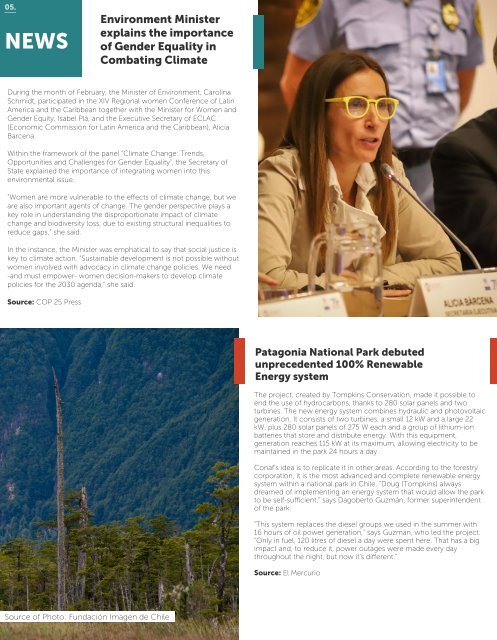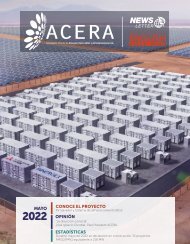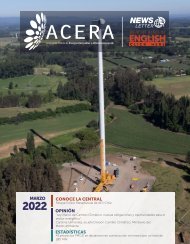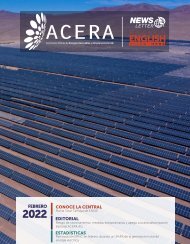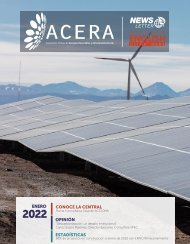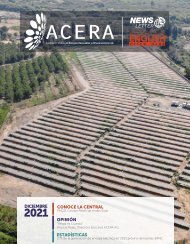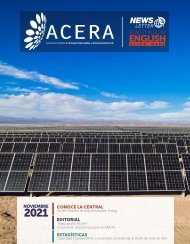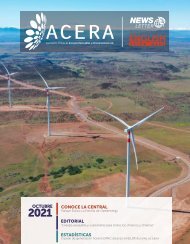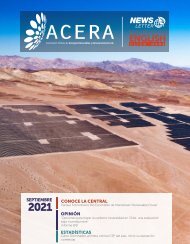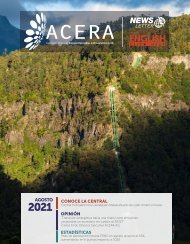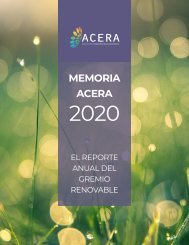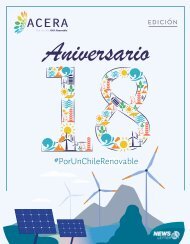Newsletter ACERA - Febrero 2020
You also want an ePaper? Increase the reach of your titles
YUMPU automatically turns print PDFs into web optimized ePapers that Google loves.
05.<br />
NEWS<br />
Environment Minister<br />
explains the importance<br />
of Gender Equality in<br />
Combating Climate<br />
During the month of February, the Minister of Environment, Carolina<br />
Schmidt, participated in the XIV Regional women Conference of Latin<br />
America and the Caribbean together with the Minister for Women and<br />
Gender Equity, Isabel Plá, and the Executive Secretary of ECLAC<br />
(Economic Commission for Latin America and the Caribbean), Alicia<br />
Barcena.<br />
Within the framework of the panel "Climate Change: Trends,<br />
Opportunities and Challenges for Gender Equality", the Secretary of<br />
State explained the importance of integrating women into this<br />
environmental issue.<br />
"Women are more vulnerable to the effects of climate change, but we<br />
are also important agents of change. The gender perspective plays a<br />
key role in understanding the disproportionate impact of climate<br />
change and biodiversity loss, due to existing structural inequalities to<br />
reduce gaps," she said.<br />
In the instance, the Minister was emphatical to say that social justice is<br />
key to climate action. "Sustainable development is not possible without<br />
women involved with advocacy in climate change policies. We need<br />
-and must empower- women decision-makers to develop climate<br />
policies for the 2030 agenda," she said.<br />
Source: COP 25 Press<br />
Patagonia National Park debuted<br />
unprecedented 100% Renewable<br />
Energy system<br />
The project, created by Tompkins Conservation, made it possible to<br />
end the use of hydrocarbons, thanks to 280 solar panels and two<br />
turbines. The new energy system combines hydraulic and photovoltaic<br />
generation. It consists of two turbines, a small 12 kW and a large 22<br />
kW, plus 280 solar panels of 275 W each and a group of lithium-ion<br />
batteries that store and distribute energy. With this equipment,<br />
generation reaches 115 kW at its maximum, allowing electricity to be<br />
maintained in the park 24 hours a day.<br />
Conaf's idea is to replicate it in other areas. According to the forestry<br />
corporation, it is the most advanced and complete renewable energy<br />
system within a national park in Chile. "Doug (Tompkins) always<br />
dreamed of implementing an energy system that would allow the park<br />
to be self-sufficient," says Dagoberto Guzmán, former superintendent<br />
of the park.<br />
"This system replaces the diesel groups we used in the summer with<br />
16 hours of oil power generation," says Guzman, who led the project.<br />
"Only in fuel, 120 litres of diesel a day were spent here. That has a big<br />
impact and, to reduce it, power outages were made every day<br />
throughout the night, but now it's different.”<br />
Source: El Mercurio<br />
Source of Photo: Fundación Imagen de Chile


